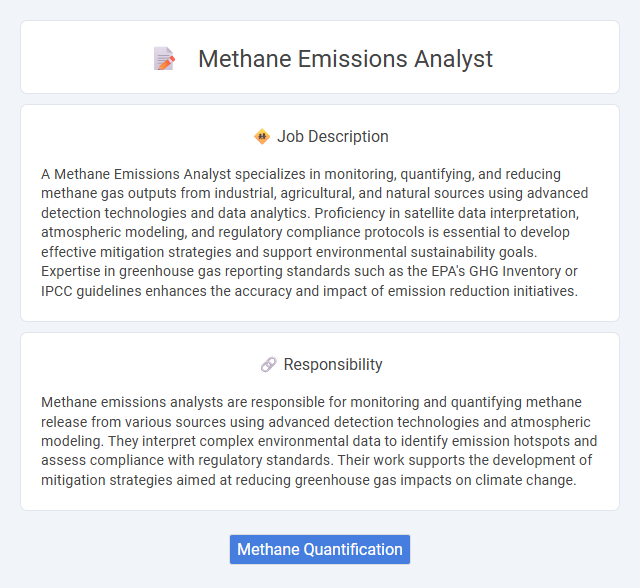
A Methane Emissions Analyst specializes in monitoring, quantifying, and reducing methane gas outputs from industrial, agricultural, and natural sources using advanced detection technologies and data analytics. Proficiency in satellite data interpretation, atmospheric modeling, and regulatory compliance protocols is essential to develop effective mitigation strategies and support environmental sustainability goals. Expertise in greenhouse gas reporting standards such as the EPA's GHG Inventory or IPCC guidelines enhances the accuracy and impact of emission reduction initiatives.
Individuals with strong analytical skills and a background in environmental science or engineering are likely suitable for a methane emissions analyst role, given the technical nature of the job. Those comfortable working with data, performing statistical analysis, and interpreting environmental impact reports may find the position aligns well with their abilities. Candidates who prefer structured tasks and have a keen interest in climate change mitigation could be more inclined to thrive in this field.
Qualification
A Methane Emissions Analyst typically requires a background in environmental science, chemical engineering, or a related field, supported by expertise in gas detection technologies and data analysis software. Proficiency in satellite data interpretation, ground-based measurement techniques, and regulatory compliance frameworks is essential for accurate emissions quantification. Strong analytical skills combined with experience in modeling methane release patterns and familiarity with industry standards such as EPA or ISO provide a competitive advantage.
Responsibility
Methane emissions analysts are responsible for monitoring and quantifying methane release from various sources using advanced detection technologies and atmospheric modeling. They interpret complex environmental data to identify emission hotspots and assess compliance with regulatory standards. Their work supports the development of mitigation strategies aimed at reducing greenhouse gas impacts on climate change.
Benefit
A Methane Emissions Analyst position likely offers the benefit of contributing to critical environmental impact assessments that drive sustainability efforts. Professionals in this role may gain access to advanced analytical tools and data modeling technologies, enhancing technical expertise and career growth opportunities. The job might also provide the chance to collaborate with interdisciplinary teams, expanding professional networks within the environmental science and energy sectors.
Challenge
Methane emissions analyst roles likely involve navigating complex data sets and addressing uncertainties in measurement techniques. Accurately identifying emission sources and quantifying atmospheric methane concentrations may pose significant technical hurdles. Balancing regulatory requirements with evolving scientific methodologies could be a continual challenge in this position.
Career Advancement
A Methane Emissions Analyst harnesses advanced data modeling and remote sensing technologies to quantify and reduce methane leaks across oil, gas, and waste management sectors. Career advancement opportunities include leadership roles such as Environmental Compliance Manager, Sustainability Director, or specialized consulting positions in climate risk mitigation. Expertise in regulatory frameworks and proficiency with tools like satellite monitoring and gas detection sensors significantly accelerate professional growth in this field.
Key Terms
Methane Quantification
Methane emissions analysts specialize in methane quantification by utilizing advanced remote sensing technologies, such as satellite data and aerial infrared imaging, to accurately detect and measure methane leaks in oil, gas, and industrial operations. They apply data analytics and atmospheric modeling to assess emission sources and volumes, enabling companies to comply with environmental regulations and reduce greenhouse gas footprints. Proficiency in geographic information systems (GIS) and experience with regulatory frameworks like the EPA's Greenhouse Gas Reporting Program are essential for optimizing methane emissions tracking and reporting.
 kuljobs.com
kuljobs.com